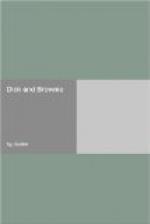Dick, who could never bear to see his little mistress crying, pushed himself forward; first he licked Huldah’s hand, and then seated himself in front of her, as though to protect her from the ogress who made her cry. Something in the ogress’s face, though, told Dick that she was not a real ogress, and he looked up at her with a world of pleading in his big brown eyes, and his long tail waving coaxingly.
“Poor doggie!” exclaimed the ogress. “Poor Dick, are you hungry, too? You do look tired and thin. Yes, you shall come in;” and the narrow stream of light became a wide river, which broke over the pair and surrounding them drew them in, until they found themselves safely landed in the cosiest little kitchen Huldah had ever seen.
It was really a very humble little kitchen, with signs of poverty everywhere, but to Huldah it was a palace. It was spotlessly clean, and as neat as a new pin, and to a child who had spent the greater part of her life in a dirty, untidy caravan, this was a sign of superiority, even of luxury.
To Dick the cleanness and neatness meant nothing, the rag mat before the hearth was the most luxurious thing he had ever seen in the whole of his life, and he stretched his lanky aching body on it with a deep sigh of perfect bliss, and promptly fell asleep.
Huldah and old Mrs. Perry meanwhile stood in the middle of the kitchen surveying each other.
“Sit down, child,” said Martha, at last, “you look fit to drop.” She spoke brusquely but not unkindly.
“Thank you, ma’am,” said Huldah, gratefully, and perched herself, with a long-drawn breath of excitement, on the edge of the hard chair nearest the door.
“Not there. Go and sit in the arm-chair by the fire-place. Would you like a cup of tea?”
“Oh!” gasped Huldah, almost too delighted to be able to find words to answer with. There was more pleasure, though, in her tone than any number of words could have conveyed.
“The kettle is on the boil. I was just going to have a cup myself, before I went to bed.”
“Oh, thank you, ma’am!” gasped Huldah, feebly, but again with a world of gratitude in her tone.
“Put down your load for a time, then, and rest your arms.” Then, as her eyes fell on the baskets the child had been carrying, “Was it one of those you offered me for a bit of bread?”
“Yes, ma’am,” answered Huldah, shyly.
“Well, you meant well, I don’t doubt, but those baskets are worth more than a bit of bread. They ought to sell for eighteenpence or two shillings each, I should say.”
“Yes, ma’am, Aunt Emma always asks half-a-crown, and then comes down to two shillings or eighteenpence,” said Huldah, innocently.
“Who’s Aunt Emma?”
Huldah hesitated a moment, somewhat at a loss how to explain. “She isn’t my real aunt, though I calls her so. She and Uncle Tom ain’t any relation to me really. They’re called Smith, and my name is Huldah Bate; but when mother died—”




